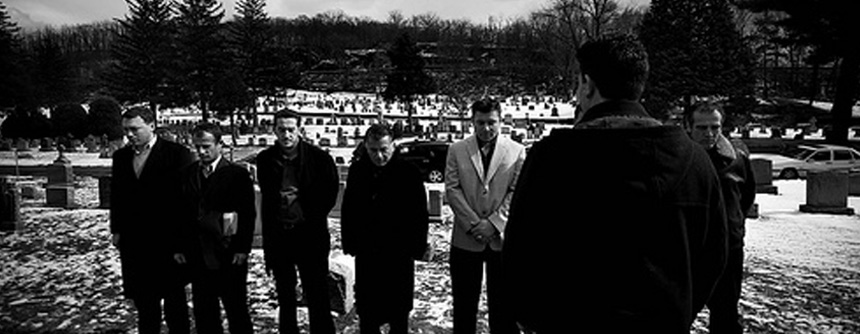Of the roughly 600 Albanian-Americans who were called up to join the Atlantic Battalion of the KLA, only about a hundred actually went to war. Florim was one of the younger members, alongside many older men who left their families behind. Most knew each other as neighbors and friends from the Albanian communities around the Bronx, Brooklyn and Westchester—but together off to Kosovo, they were brothers in arms. Most lacked any prior military training, emboldened only by sheer patriotism and the will to fight against a recurrence of events that deeply scarred Bosnia. Especially searing were stories from Srebrenica, when about 8,000 Bosnian men and boys were killed by Serb paramilitaries in July 1995 while international peacekeepers stayed on the sidelines.
“We figured that the only way to do it if they weren’t getting involved was go fight ourselves, and that’s the only way you can liberate your country—or at least defend it,” Florim declares. “One of the reasons is not to go fight to become a man or whatever, it’s nothing to do with that. It’s growing up and watching what the Serbs have done in Bosnia and Croatia—and especially in Bosnia…. I couldn’t just sit back and watch them try to do the same thing to my people, my family. I just didn’t feel comfortable sitting here watching this happen.”
The KLA’s Atlantic Battalion spent its first four weeks in a rebel training camp in Burrel, in north-central Albania. Florim was initially training to be a heavy gunner alongside his friend Sadrixh, but both were later given the position of sniper when it became apparent that they were good marksmen. In May, the Battalion moved to northern Albania into Mt. Pastrik on the Kosovo-Albania border, where the KLA were already engaged in gunfights and artillery shelling with Serb forces. Florim remembers being able to see the Serbs sunbathing when they weren’t shooting, and while other Battalion members recall Serbs sticking up their middle fingers or mooning the enemy lines.
Lajqi recalled the times he spent on the front, spent with fellow New York Albanians, including three brothers of the Bytyqi (Bu-tu-chi) family from Yonkers. Yll (Youl), 24, Agron, 23 and Mehmet, 21, had been assigned to different locations on the front, so they wouldn’t run the risk of being killed in the same attack. Lajqi said he was closest to Yll, “the quiet one.”
By the second week of June, and after 11 weeks of NATO bombing campaigns, the war was over. Milosevic was forced to withdraw Yugoslav forces and to seek a ceasefire. Despite some serious injuries, the battalion took no casualties, and its members began to trickle home back to the United States, while others went to meet with family or comrades in different parts of Kosovo.
Florim decided to return home, while the Bytyqi brothers stayed in Kosovo. There are various stories as to what the brothers were doing in the weeks after the war, but the prevailing version is that they were attempting to help several Roma men, fearing attacks from returning Albanians, escape into Serbia. These same men had helped the Bytyqi brothers’ family during the war; the Bytyqis wanted to repay their kindness to them, and so agreed to help with an escape. While in Serbia, the brothers were arrested by Serb police, charging them with being in the country illegally. They were imprisoned and released shortly afterward, but ended up in the hands of Yugoslav paramilitary forces. Their remains were found two years later, in a mass grave.
“They were tortured, beaten, and then executed and dumped in a mass grave in a national park next to Belgrade,” remembers Florim. Seventy-four bodies were found in Petrovo Selo, a village in eastern Serbia. Investigations into the sequence of events and who was responsible for the mass killings continue. In the meantime, the Bytyqi family has flown the brothers’ remains back to New York.
“These three brothers were on top of the grave when they excavated, and the only way they could identify them is because they had New York State drivers’ licenses—all three of them were born here,” remarked Florim, adding that they were found with canvas bags pulled over their heads, bullet wounds to the skull, barbed wire around their torsos, and hands tied behind their backs.
Almost 9 years after the war, the men of the Atlantic Battalion have long returned to New York to get on with their lives, but Florim has never been able to fully move on. Kosovo’s declaration of independence, at long last, offered a chance to make peace with the past. Florim bought his plane tickets to Prishtina only days before flying out to make it in time for the historic transfer of power in Kosovo. With his wife, Kaltrina, and his friend Valon at Terminal 1 in JFK airport, Florim reveled at the thought of the parties that would take place. Kaltrina stood next to him bemoaning the trip she was missing out on, adding for the second time that she wished she could take off time from work. For Florim though, returning to Kosovo for this historic day wasn’t only about the celebrations.
“I’m going to go to Prizren”—a town in southeast Kosovo—“to take the soil from the ground there, to bring it back to my friends’ graves,” he said, referring to the Bytyqi brothers, who are buried in Yonkers. Prizren, Florim explained, was close to their front line during the war, and he wanted to bring something back from the homeland that was as meaningful as possible. Before going through the security check, Florim held and kissed his wife. “I’ll miss you,” he said. “Be back soon.”

